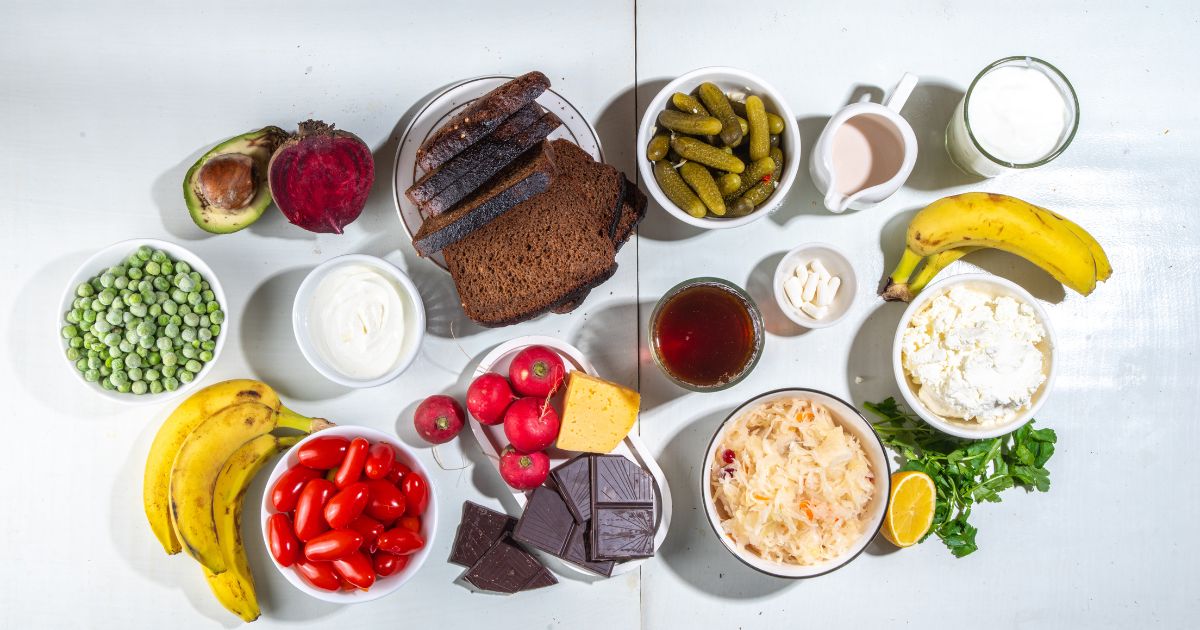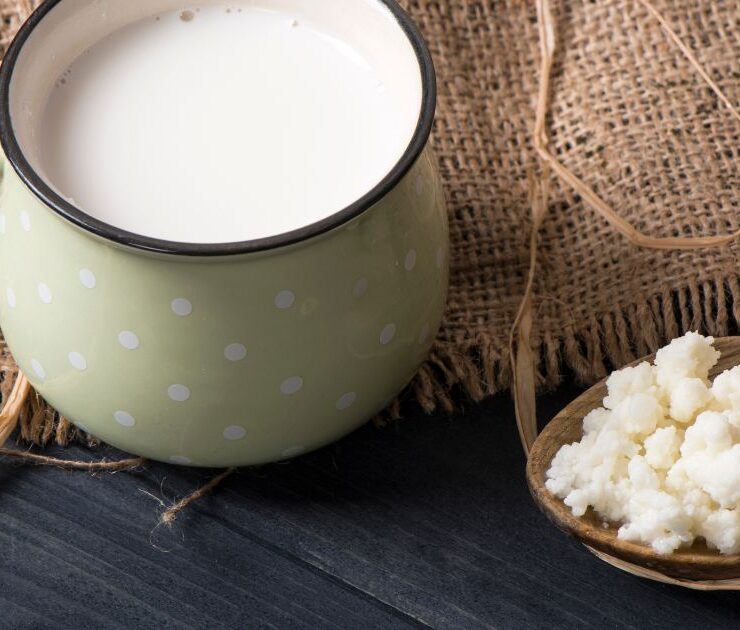Gut Health Essentials: Understanding Prebiotic vs Probiotic

Caroline Locatelli is a vibrant individual, blending her Brazilian and…
In recent years, gut health has emerged as a trending topic of research, with a growing recognition of its significant impact on overall well-being. A recent survey conducted among over 71,000 Americans shed light on the prevalence of gastrointestinal (GI) symptoms, revealing a staggering burden within the general U.S. population. Despite digestive diseases already accounting for over 100 million ambulatory care visits annually in the U.S., there remains a pressing need to further understand the true extent of GI symptoms’ burden, underscoring the importance of prioritizing research and interventions in this critical area of healthcare.
Exploring the Gut Microbiome

The gut microbiome is like a bustling community of tiny organisms living in our digestive system, including bacteria, viruses, and fungi. They help us digest food, absorb nutrients, and keep our immune system in check.
Importance of Gut Microbiome for Overall Health
Our gut buddies play a big role in keeping us healthy. They help with things like digesting food, fighting off bad germs, and even affecting our mood. Having a diverse and balanced gut community is linked to lower risks of diseases like obesity, diabetes, and even depression.
Factors Influencing Gut Microbiome Composition
Lots of things can influence our gut buddies. What we eat, how active we are, and even how stressed we feel can all make a difference. Eating plenty of fruits, veggies, and whole grains can keep our gut buddies happy, while processed foods and stress might upset them. Understanding these factors can help us keep our gut health in check.
Understanding Probiotics

Probiotics are like the friendly superheroes living in certain foods and supplements. They’re live microorganisms, mostly good bacteria, that can boost our gut health. You can find them in foods like yogurt, kefir, pickles, and even some cheeses.
Functions and Benefits of Probiotics
These gut superheroes have some pretty cool powers. They help us digest food, produce vitamins, and fight off bad bacteria that can make us sick. Plus, they can strengthen our immune system and even improve our mood and mental health.
Once these friendly bacteria enter our gut, they get to work right away. They multiply and set up camp in our intestines, crowding out the bad bacteria and keeping them in check. They also produce helpful substances that keep our gut environment healthy and balanced. So, by taking probiotics, we’re basically inviting these superhero bacteria to protect and support our gut health from the inside out.
Unveiling Prebiotics
Prebiotics are like the nutritious fuel for our gut superheroes, the probiotics. They’re special types of fiber found in certain foods that our bodies can’t digest but that our gut bacteria love. You can find prebiotics in foods like bananas, onions, garlic, oats, and certain whole grains.
Functions and Benefits of Prebiotics
These fiber superheroes have some impressive benefits. They not only nourish our gut bacteria, helping them grow and thrive, but they also promote a healthy environment in our gut. By feeding our probiotics, prebiotics help maintain a balanced gut microbiome, which can improve digestion, boost our immune system, and even reduce inflammation throughout our body.
How Prebiotics Support Gut Health
Once we consume prebiotics, they travel through our digestive system without being digested. When they reach our colon, they become food for our gut bacteria, particularly the beneficial ones. As our probiotics munch on these prebiotics, they produce beneficial byproducts like short-chain fatty acids, which help keep our gut lining healthy and our immune system strong. So, by including prebiotic-rich foods in our diet, we’re essentially providing our gut superheroes with the fuel they need to keep our gut and overall health in tip-top shape.
Synergistic Effects: Probiotics and Prebiotics
Probiotics and prebiotics make a dynamic duo when it comes to supporting our gut health. Probiotics, the friendly bacteria, thrive on prebiotics, the indigestible fiber found in certain foods. When we consume prebiotics, they act as food for the probiotics, helping them grow and flourish in our gut. This symbiotic relationship strengthens the population of beneficial bacteria in our gut, enhancing their ability to perform their essential functions.
Importance of a Balanced Gut Microbiome
Maintaining a balanced gut microbiome is crucial for overall health and well-being. When probiotics and prebiotics work together harmoniously, they promote a diverse and thriving community of gut bacteria. This balanced microbiome is associated with improved digestion, enhanced immune function, and reduced inflammation, among other benefits. By fostering a healthy gut microbiome, we can support various aspects of our health and reduce the risk of gastrointestinal issues and other health conditions.
Strategies for Incorporating Probiotics and Prebiotics into Diet
Incorporating probiotics and prebiotics into our diet is easier than it may seem. We can include probiotic-rich foods like yogurt, kefir, sauerkraut, and kombucha in our meals and snacks. Additionally, we can consume prebiotic-rich foods such as bananas, onions, garlic, oats, and legumes to nourish our gut bacteria. Including a variety of these foods in our diet ensures that we’re providing our gut microbiome with the diverse range of nutrients it needs to thrive. Additionally, considering probiotic and prebiotic supplements can be beneficial for individuals looking to boost their gut health, especially if dietary sources are limited.
Choosing the Right Supplements
When selecting probiotic and prebiotic supplements, it’s essential to understand how to decipher supplement labels. Look for key information such as the type and quantity of probiotic strains or prebiotic ingredients included in the supplement. Additionally, check for any additional additives or fillers that may be present.
Factors to Consider When Selecting Probiotic and Prebiotic
Supplements Several factors should be taken into account when choosing probiotic and prebiotic supplements. Consider the potency and viability of the probiotic strains, as well as the diversity of strains included in the supplement. Look for supplements that contain strains known to benefit gut health, such as Lactobacillus and Bifidobacterium species. Additionally, consider the form of the supplement (e.g., capsules, powders, or liquids) and any special considerations, such as refrigeration requirements or allergen information.
Potential Risks and Side Effects
While probiotic and prebiotic supplements are generally considered safe for most individuals, there are potential risks and side effects to be aware of. Some people may experience digestive discomfort, such as gas, bloating, or diarrhea, when first starting probiotic or prebiotic supplements. Additionally, individuals with compromised immune systems or underlying health conditions should consult with a healthcare professional before taking these supplements, as they may be at higher risk for adverse effects. It’s also important to follow the recommended dosage instructions provided on the supplement label and to discontinue use if any concerning symptoms arise.
Practical Tips for Gut Health
To support a healthy gut, focus on incorporating a variety of fiber-rich foods into your diet, such as fruits, vegetables, whole grains, legumes, and nuts. These foods provide prebiotics, which nourish beneficial gut bacteria. Additionally, include fermented foods like yogurt, kefir, sauerkraut, and kimchi, which contain probiotics that can help maintain a balanced gut microbiome. Limiting intake of processed foods, sugary snacks, and excessive alcohol can also promote gut health.
Lifestyle Factors Impacting Gut Microbiome
Several lifestyle factors can influence the composition and diversity of the gut microbiome. Prioritize regular physical activity, as exercise has been shown to support a healthy gut microbiome. Aim for adequate sleep, as insufficient sleep can negatively impact gut health. Manage stress through techniques such as meditation, deep breathing exercises, or yoga, as chronic stress can disrupt the balance of gut bacteria. Avoid smoking and limit exposure to environmental toxins, as these can also affect gut microbiome health.
Integrating Gut-Healthy Practices into Daily Routine
Incorporate gut-healthy practices into your daily routine by meal planning and preparing homemade meals using fresh, whole ingredients. Experiment with new recipes that feature gut-friendly foods like fermented vegetables or whole grain salads. Prioritize hydration by drinking plenty of water throughout the day, as adequate hydration supports proper digestion and nutrient absorption. Additionally, consider keeping a food diary to track how different foods affect your gut health, and adjust your diet accordingly. Finally, aim for consistency in your gut-healthy habits, making them a regular part of your lifestyle for long-term benefits.
Takeaway
Maintaining a healthy gut is essential for overall well-being. A balanced gut microbiome is associated with improved digestion, enhanced immune function, reduced inflammation, and even better mental health. By prioritizing gut health maintenance through dietary and lifestyle choices, individuals can optimize their overall health and reduce the risk of various health conditions.
As research in gut health continues to evolve, future directions may focus on further elucidating the intricate interactions between gut microbiota and human health. This includes investigating personalized approaches to gut health management, exploring the impact of environmental factors on the gut microbiome, and developing innovative interventions to promote gut health. By advancing our understanding of gut health, we can pave the way for novel strategies to improve health outcomes and enhance quality of life for individuals worldwide.
Caroline Locatelli is a vibrant individual, blending her Brazilian and Italian heritage into her life and career. Having resided in Los Angeles for nine years, she brings a unique fusion of cultural influences to the city's dynamic landscape. Prior to her time in LA, Caroline polished her skills in New York City, gaining invaluable experience within the hospitality and real estate industry. Caroline is recognized as a significant figure, known for her ability to connect with the city's elite tastemakers and VIP clientele, including celebrities. Her extensive network and adept communication skills have positioned her as a key player in the scene, facilitating collaborations and forging meaningful relationships. Beyond her professional endeavors, Caroline's social life reflects her vibrant personality. Whether she's hitting the dance floor with friends or assuming the role of the consummate hostess at her legendary dinner parties, Caroline infuses every gathering with a sense of warmth, flavor, and flair.



